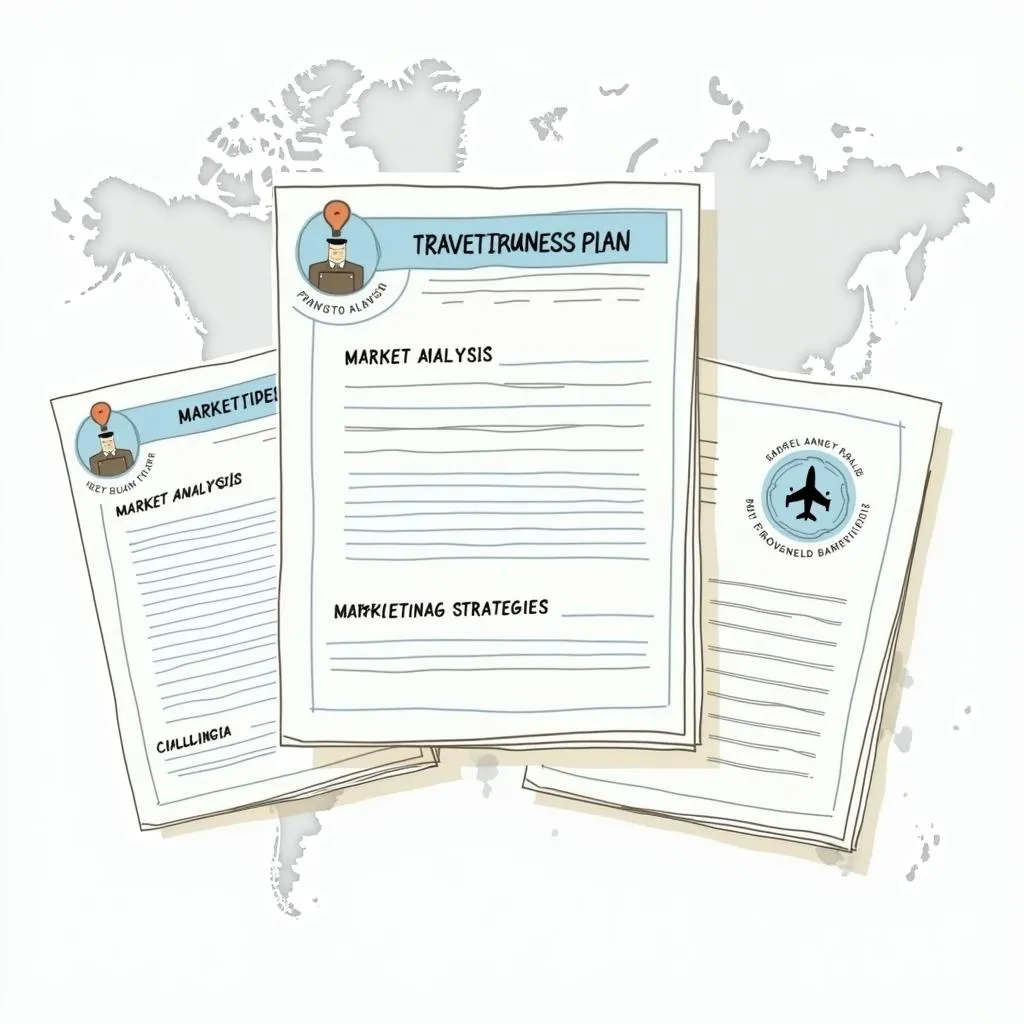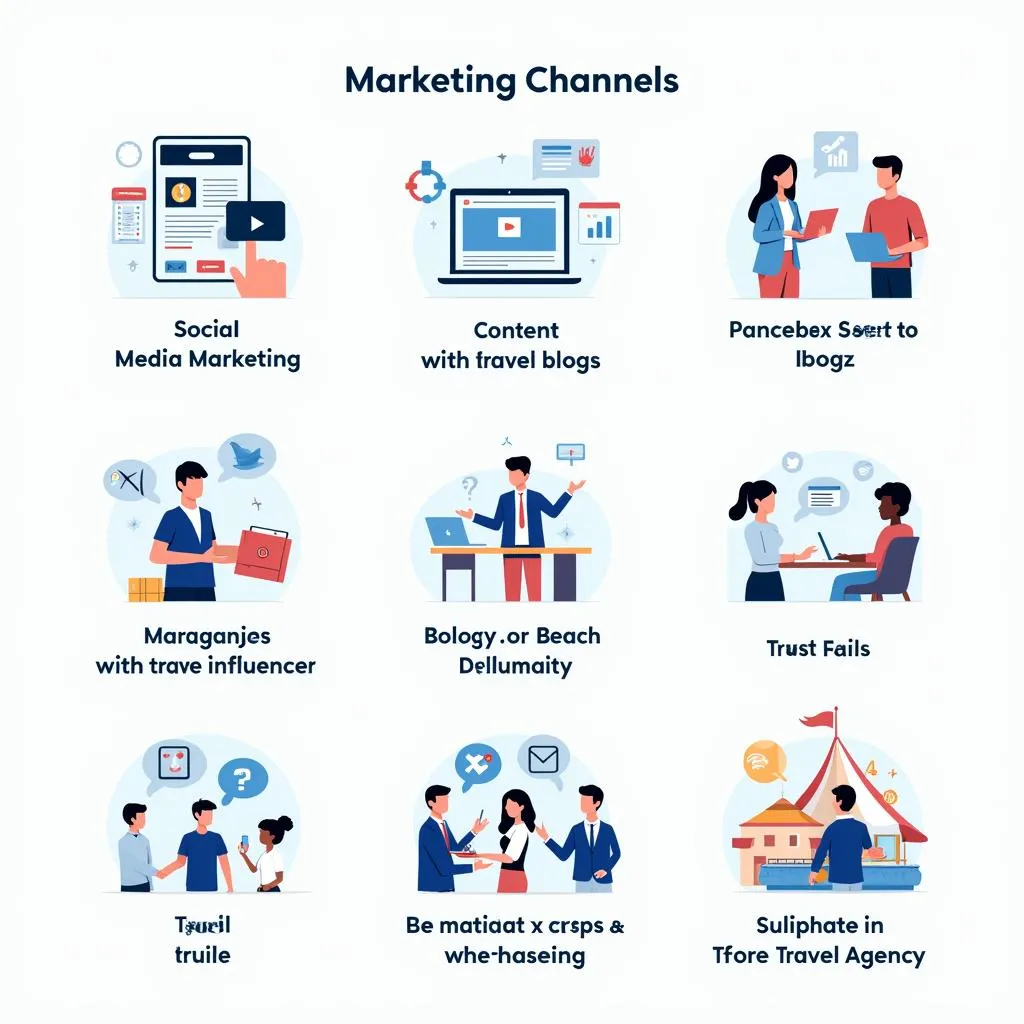“The world is a book and those who do not travel read only one page.” – Saint Augustine.
Starting a travel agency can be an exciting and rewarding venture, especially if you’re passionate about exploring the world and sharing those experiences with others. But like any business, it requires meticulous planning to navigate the competitive travel landscape. That’s where a robust travel agency business plan comes in. This document acts as your roadmap, outlining your agency’s vision, target market, marketing strategies, and financial projections.
Whether you dream of curating bespoke luxury vacations to the Maldives or crafting budget-friendly backpacking adventures through Southeast Asia, a well-structured business plan is crucial for securing funding, attracting partners, and ultimately achieving success.
This article provides a comprehensive guide to crafting an effective travel agency business plan template, equipping you with the tools to turn your entrepreneurial dreams into a thriving reality.
Understanding the Importance of a Travel Agency Business Plan
Before diving into the specifics of a sample template, let’s first understand why a business plan is non-negotiable:
- Clarity & Focus: It compels you to articulate your agency’s niche, target audience, and unique selling propositions, preventing mission creep and ensuring everyone is on the same page.
- Funding Magnet: A well-researched plan with realistic financial projections is crucial for attracting investors or securing loans from banks.
- Competitive Edge: Thorough market analysis and competitor research highlighted in your plan help you identify opportunities and differentiate yourself in a crowded market.
- Roadmap to Success: It acts as a living document, guiding your operations, marketing efforts, and growth strategies as your agency evolves.
 Travel Agency Business Plan Illustration
Travel Agency Business Plan Illustration
Dissecting the Travel Agency Business Plan Template
A comprehensive business plan typically includes the following key sections:
1. Executive Summary
Think of this as your elevator pitch. It provides a concise overview of your agency’s mission, target market, competitive advantages, and financial highlights. While it appears first, it’s often written last, summarizing the key points of your detailed plan.
2. Company Description
This section delves deeper into your agency’s identity, outlining:
- Business Name & Structure: Your chosen legal structure (sole proprietorship, partnership, LLC, etc.) impacts liability and taxation.
- Mission Statement: This succinctly defines your agency’s purpose and values.
- Vision Statement: This outlines your long-term aspirations for the agency.
- Products & Services: Detail your offerings – flights, accommodations, tours, cruises, visa assistance, travel insurance, etc.
3. Market Analysis
This section demonstrates your understanding of the travel industry and your target market:
- Industry Overview: Analyze current trends, growth potential, and challenges within the travel sector.
- Target Market: Define your ideal customer (age, interests, travel style, budget) and their travel needs.
- Competitive Analysis: Identify your main competitors, their strengths & weaknesses, and your strategies for differentiation.
4. Marketing & Sales Strategy
This section outlines how you’ll reach your target audience and convert them into customers:
- Marketing Channels: Specify your mix of online and offline strategies – social media, content marketing, travel blogs, partnerships with influencers, travel fairs, print advertising, etc.
- Pricing Strategy: Explain your pricing model (commission-based, service fees, package deals) and its competitiveness.
- Sales Process: Detail how you’ll engage leads, handle inquiries, provide quotes, and secure bookings.
 Travel Agency Marketing and Sales Strategy
Travel Agency Marketing and Sales Strategy
5. Operations Plan
This section outlines the day-to-day functioning of your agency:
- Legal & Regulatory Compliance: Highlight licenses, permits, and industry regulations you’ll adhere to.
- Technology & Software: List booking systems, accounting software, customer relationship management (CRM) tools, and other technology essential for your operations.
- Team & Staffing: Describe your team’s expertise and any planned hires.
6. Financial Projections
This section provides a realistic picture of your financial health:
- Startup Costs: Detail initial investments required – office space, technology, marketing, licensing.
- Revenue Projections: Estimate your income over the next 3-5 years based on market research and sales forecasts.
- Expense Budget: Outline operating expenses – rent, salaries, marketing, utilities.
- Funding Request (if applicable): Clearly state the amount of funding you need and how you’ll use it.
Tips for Crafting a Winning Travel Agency Business Plan
- Keep it Concise & Focused: Avoid jargon and unnecessary fluff.
- Be Realistic: Base your financial projections on thorough market research and avoid overly optimistic assumptions.
- Highlight Your Unique Value Proposition: What sets your agency apart? Personalized service? Niche expertise? Competitive pricing?
- Proofread Meticulously: Errors can undermine your credibility.
 Successful Travel Agency Owner
Successful Travel Agency Owner
Frequently Asked Questions (FAQs)
Q: Do I need a business plan even if I’m not seeking external funding?
A: Absolutely! It’s valuable even for self-funded ventures, providing clarity and acting as a guide for your operations.
Q: How often should I update my business plan?
A: Review and update it annually or whenever significant changes occur in your business model, market conditions, or goals.
Travelcar.edu.vn: Your Partner in Travel Industry Insights
For further guidance and resources on navigating the dynamic world of travel and tourism, visit TRAVELCAR.edu.vn. We provide valuable insights, industry news, and expert advice to empower travel professionals.
Conclusion
Writing a travel agency business plan is an investment in your venture’s success. By thoroughly researching, planning, and articulating your vision, you’ll be well-positioned to navigate the competitive travel landscape and turn your entrepreneurial dreams into a thriving reality.
Remember, the journey of a thousand miles begins with a single step – and in the case of your travel agency, that step is crafting a solid business plan.